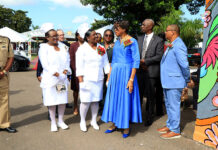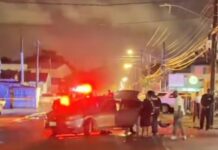 <<< Robert Hill installed a video camera in his house because he was concerned about his safety.
<<< Robert Hill installed a video camera in his house because he was concerned about his safety.
Kingston, Jamaica — With 268 armed gangs or neighbourhood ‘corner crews’ locked in deadly turf wars, Jamaica is one of the most violent societies on earth.
With a population of less than three million people, police kill hundreds of people every year in what they claim are crime-related shootouts, making Jamaica’s police force among the deadliest in the world.
Rights groups say that these shootings add up to a campaign of extra-judicial executions carried out by police who have taken the law into their own hands.
The official police response to these allegations cannot be recorded – the commissioner has issued standing orders which ban all officers from speaking to foreign journalists.
But, as reporter Simon Ostrovsky discovered, many others in Jamaica are prepared to speak out. One of them, Robert Hill, an entertainer, actually warned of his own impending death.
“Hello Jamaica. I’m Robert Hill AKA Kentucky Kid. I really don’t know what is going on but all I know, police are covering up for each other and they’re trying to kill me,” Hill explained in a video message.
Robert Hill installed a video camera in his house because he was concerned about his safety.
Hill went on to explain how his car had been hit by a police car that had passed through a red light.
Hills car was badly damaged in the incident and he was taken to the police station to give a written statement.
But after waiting for four hours, Hill was sent home and told to return within 24 hours to submit the statement.
When he returned the following day, the police told him that they could not take his statement.
“They told me that they could not take my statement, [and asked] why I did not give it [at] the time of the accident. I told them that Sergeant Gardener told me to return to give it,” Hill explained.
When he refused to leave without providing a statement, Hill said he was physically forced out of the building.
“All I know is I can’t get any justice. Who will fix my car? Who will take care of my health?” Hill asked in his video message.
Fearful
Kimmo Matthews, a reporter for the Jamaica Observer, says Hill was concerned for his safety.
“The first time he came in and spoke to us it was evident that he was really concerned. He had mentioned that police had threatened him at his home and they were intimidating him.”
Hill saw a legal aid lawyer who advised him to install a camera in his house. He followed their advice.
Many Jamaicans are angered by police violence and corruption
“After installing the camera he came to me three days later showing me some video footage of what appeared to be police manhandling him along with his wife. It appeared they were holding him and pushing him around in a room and they were asking him questions,” Matthews says.
Hills wife was eight months pregnant when she was beaten by police along with her husband.
Hill told Matthews that members of the police wanted him to drop his case and had resorted to intimidation and physical violence to make him do so.
When Hill took the video of the violence to the police high command, he said nobody was willing to help him.
“I can’t get any justice from anyone in Jamaica. All I know is everywhere I go for justice in the police force there is someone there trying to kill me or someone there trying to set me up with the police,” Hill said.
“So I would like the whole world to check this out, listen to this, and know that if I’m dead or anything happens to me, it’s the Jamaican police that carry out that work or that order.”
Shot dead
On December 8, 2009 Robert Hill was shot dead by the Jamaica Constabulary Force (JCF). The police report said they were forced to shoot because Hill had a gun.
Kumiko, Hill’s wife, said Hill had received a call that night from someone who said they wanted to see a car that he was selling.
He told her he was going out to show it to them but would be right back.
His cousin accompanied him, but Hill had forgotten the car key and asked his cousin to return to the house for it.
“The Robert Hill case perhaps is a nadir for Jamaica because Robert went and caught the people on tape,” says Carolyn Gomes, a medical doctor and the executive director of Jamaicans for Justice.
“You can see them, their faces, you can see them beating him and his wife. You can see them threatening him, and he took that tape to the police high command and they came back and killed him.”
“It was too much. It was too much for me to bear. Up to this point I cannot believe that he is dead, that he is gone, just because of a car,” says Hills mother, Caroline.
Robert Hill was one of 224 people killed in police shootings last year.
“In the last ten years, 1,900 of our Jamaican citizens, officially, have been killed by the police, more than 1,900. In that time, one policeman has been convicted of manslaughter and he has been freed on appeal,” Gomes says.
Corruption and crime
Police blame Jamaica’s high crime rates and gang violence.
The national security ministry estimates that there are 268 gangs active in Jamaica.
Jamaican police kill hundreds each year in what they claim are crime-related shootouts
Horace Levy of the Peace Management Initiative says that the police often treat corners crews in the same way as criminal gangs and that it is the black people in the inner cities of Jamaica who are dying at the hands of the police.
“Each time we keep hearing the same reports. Police engaged a man in a shootout, firearm was recovered, a revolver, three live rounds. It’s always amazing how when you hear of the incidents the residents always have a story totally different from what the police are saying,” Matthews says.
Levy says that many of the police are frustrated because known criminals are being released back onto the streets after just weeks or months in prison.
“The fact is that this is probably one of the most difficult and dangerous places to police in the world because the number of illegal firearms that are on the streets is enormous. And that’s a situation that’s developed over the past 30 years,” Mark Shields, the former deputy commissioner of police, says.
“We have to acknowledge that the JCF is rivven with corruption and crime and we have to make some very difficult decisions around well what we going to do about it? How are we going to protect the citizens of the country, how are we going to protect the good police, the good civilians who work with the police. How can we make their job easier and how can we make the public trust the good police?”
Gomes and Jamaicans for Justice believe that the current police force should be disbanded and that a new service should be created to protect Jamaica’s citizens.
“If you gave them equipment, if you gave them the laws and they were not reformed, they continue to be corrupt, than obviously it’s time that you dismantle and abandon that police force and form a new one,” says Reneto Adams, a former senior superintendent of the JCF.
Eight months after Robert Hill gave the video tape showing him and his wife being beaten to the police high command, and three months after he was killed, no action had been taken against the officers involved and investigations were still in progress.







